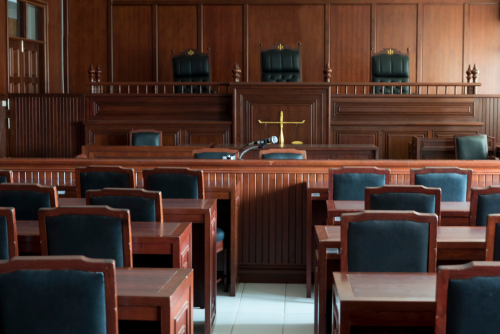Federal judge ends clash with defense lawyer by walking out of courtroom during his argument

Image from Shutterstock.
A lawyer has filed a motion that objects to a federal judge’s decision to leave the bench during a hearing on suppression of evidence against his client.
Benjamin Schiffelbein, an assistant federal public defender, filed the motion after he was forced to make his Aug. 23 arguments to an empty bench, the Roanoke Times reports.
The Sept. 17 motion acknowledges clashing with U.S. District Judge Elizabeth Dillon of the Western District of Virginia as Schiffelbein sought more information on an officer’s claims that he was justified in searching a convicted felon’s pickup truck because he saw firearms in plain sight.
Schiffelbein represented the man, Alan Wagoner, who was charged with illegally possessing firearms as a convicted felon and possessing an illegal sawed-off shotgun, according to the Roanoke Times.
The weapons weren’t caught on the officer’s body camera and cruiser camera, according to the motion. During the hearing, the officer said he had taken photos of the firearms that were later destroyed, that his body camera footage was somehow truncated, and that his vehicle’s cruiser camera had not been working for about a year, according to Schiffelbein.
Schiffelbein said he was unaware of any of this information until the officer testified. The lawyer began to question the deputy as to whether any writings existed that could corroborate or refute the officer’s claims.
The prosecutor objected, and Dillon sustained the objection. Schiffelbein asserted that he was seeking production of the materials; the prosecutor countered that the government wasn’t aware of any records that Schiffelbein was seeking.
“And the fact that this officer noticed a year and a half ago that there was something wrong with his dash-cam video has no bearing on the issues before the court,” the prosecutor said.
Dillon told Schiffelbein to move on with issues before the court that day. When Schiffelbein persisted, Dillon ordered him to file a written motion to compel production of the information.
“Counsel attempted to explain why the questioning was relevant,” Schiffelbein wrote, “and why requesting additional briefing was not the appropriate course of action given that the witness was on the stand and the [Jencks] Act requires disclosure to facilitate questioning the witness.”
Dillon told Schiffelbein that his request was noted, and the court was moving forward with the proceedings. Schiffelbein said he wanted to make a record of his argument that the proceeding shouldn’t go forward without the written materials.
Schiffelbein went on to explain what happened next.
“This court, in response, quite unexpectedly rose from the bench and left the courtroom with the parting instruction: ‘… You may proffer that while I’m out of the courtroom.’ Thereafter, with court still in session, undersigned counsel did as instructed—gave an offer of proof in a courtroom with all in attendance except the presiding judge.”
Schiffelbein argued to the empty bench that there is no benefit to getting the written material unless he is allowed to reopen the hearing.
Schiffelbein’s motion said he was unable to find a federal case with similar facts, but he found an Indiana Supreme Court case in which a trial court was found to have abused its discretion by refusing to allow a lawyer to make an offer of proof.
The Roanoke Times spoke with Ron Bacigal, a professor at the University of Richmond School of Law, who said the judge’s action was unusual, but she does not appear to have violated any procedural rules.
Bacigal told the Roanoke Times that proffers are made to create a record for appellate courts, so the matter was essentially out of the judge’s hands when she left the courtroom.



